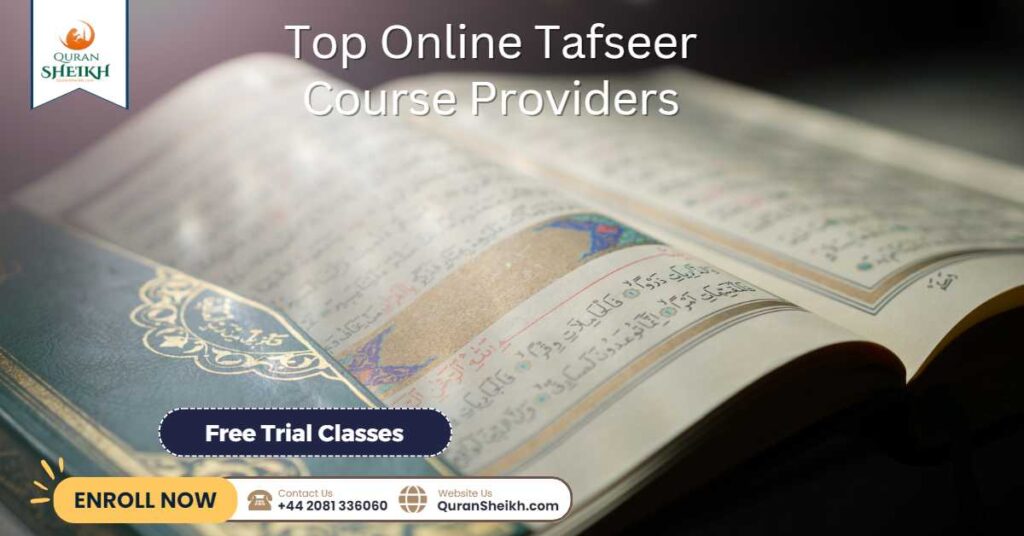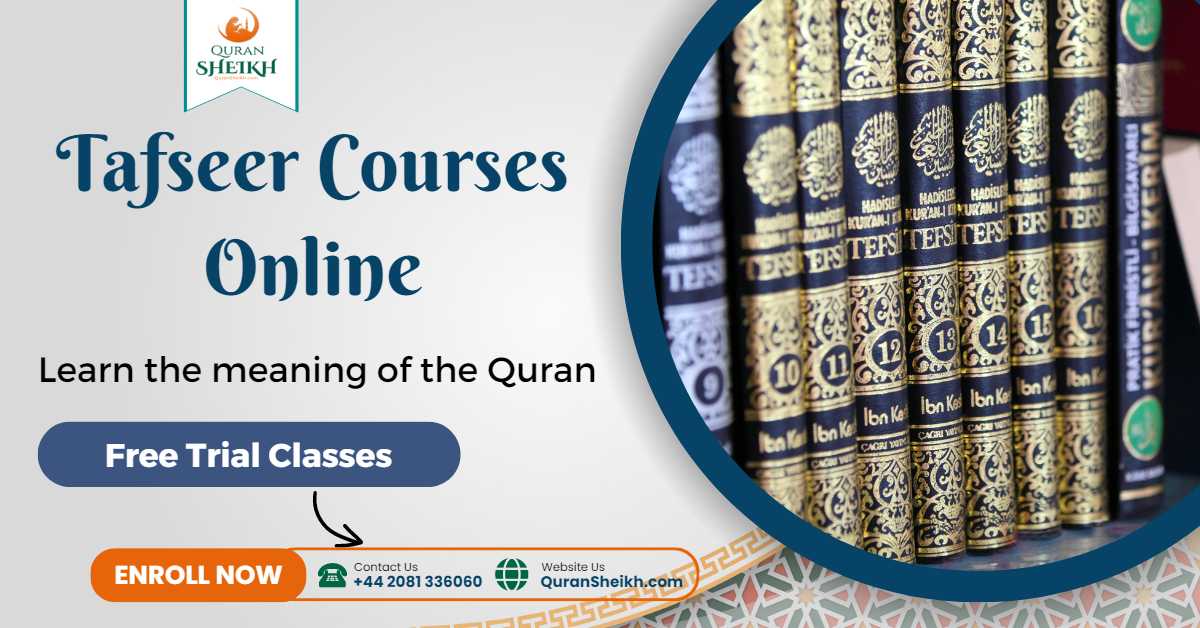One of the crucial components of Islamic education involves Tafseer – the unraveling of Quranic meanings.
Online education has made it possible for students to take Tafseer courses from the comfort of their homes.
Studying the Quran and gaining a profound comprehension of its teachings is made easier with Online Tafseer courses, known for their affordability and flexibility.
This article will explore the world of online Tafseer courses. We will focus on the advantages of e-learning, top-rated providers, course frameworks, module details, and hacks to guarantee success. Lastly, we will discuss the future of online Tafseer education.
This article offers valuable insights on online Tafseer education. It can help people gain a better understanding of Islamic traditions and learn more about Quranic principles. It is enlightening and provides a range of insights.
Join thousands of Muslim Families who love learning Quran, Arabic and Islamic Studies from the comfort of their Homes.
Introduction to Tafseer
What is Tafseer?
Tafseer is the study and interpretation of the Holy Quran.The analysis required is a thorough examination of both the verses and their historical context.
Through Tafseer, Muslims can gain a more profound comprehension of the Qurans message and find direction for their daily lives.
Why is Tafseer Important?

Tafseer is crucial in comprehending the Quran’s message and applying it to daily life. The Quran is understood, appreciated and applied more easily thanks to its insightful teachings.
Tafseer is also important in avoiding misunderstandings and misconceptions about the Quran, which may lead to wrong interpretations.
Traditional vs. Online Tafseer Courses
Traditionally, Tafseer courses were held in Islamic institutions, mosques, and Islamic universities.
However, with the advent of technology, online Tafseer courses have become more popular.
Online Tafseer courses offer the flexibility of time and location, making learning more accessible.
Additionally, the availability of experienced teachers and the use of interactive technology make online Tafseer courses a viable option for students globally.
The Benefits of Online Tafseer Courses

Convenience and Flexibility
One of the advantages of online Tafseer courses is their flexibility. From any corner of the globe, learners can take part in classes at their own pace.
Online Tafseer courses provide an opportunity for students to balance their studies with other commitments, such as work or family.
Cost-Effective
Online Tafseer courses are more cost effective than traditional courses because they have lower overhead costs. Students save money on accommodation, transport, and course fees.
Additionally, most online Tafseer courses offer payment plans and financial aid that make education more accessible to a broader audience.
Access to Expertise
Online Tafseer courses provide access to expert teachers and scholars globally, who may not be accessible in traditional classrooms. The use of technology allows students to interact with knowledgeable teachers from different parts of the world.
An inclusive approach promotes greater insight into Tafseer, as students learn from a variety of vantage points.
Interactive Learning
Online Tafseer courses provide interactive learning environments that enable students to ask questions and get feedback. The use of features like chat rooms, discussion boards, and live classes creates a collaborative learning atmosphere.
By engaging with one another, students can acquire knowledge from a diverse range of experiences and ultimately deepen their grasp of Tafseer principles.
Quran Memorization Course Online with an Arab teacher with 30% Off
Top Online Tafseer Course Providers

Overview of Popular Tafseer Course Providers
There are many online Tafseer course providers, but some of the popular ones include Al-Maghrib Institute, Bayyinah Institute, SeekersGuidance, and Qalam Institute.
These institutions offer a variety of Tafseer courses that cater to different levels of understanding.
Comparison of Tafseer Course Providers
A comparison of Tafseer course providers involves evaluating each institution’s courses’ quality, duration, and cost.
It also involves considering the accessibility of the courses and the quality of the instructors.
It is essential for students to conduct thorough research on each provider before selecting the one that meets their needs.
Review of Tafseer Course Providers
Reviews of Tafseer course providers provide an insight into the student experience and the quality of instruction.
Students can read reviews from past students and evaluate their level of satisfaction with the course provider.
This information is helpful in making informed decisions when choosing an online Tafseer course provider.
Tafseer Course Curriculum and Structure
Overview of Tafseer Course Curriculum
Tafseer courses cover different aspects of Quranic interpretation, including the historical context, grammar, and linguistic analysis.
Daily life application of Quranic teachings is included in the curriculum, along with interpretation of the text.
Types of Tafseer Courses
Online Tafseer courses vary in intensity and depth, from beginner to advanced levels. Some courses cover specific topics like Surah or Ayah analysis.
Others may focus on a particular school of thought or interpretation, such as Shia or Sunni Tafseer.
Tafseer Course Structure
Online Tafseer courses are structured differently depending on the institution.
Some courses offer self-paced learning, while others follow a specific schedule.
Most courses involve lectures, assignments, and assessments that test the student’s understanding of the course material.
The course structure aims to provide a comprehensive understanding of Tafseer, ensuring that students can apply what they learn to their daily lives.seer Education
How to Choose the Right Tafseer Course for You
Online Tafseer courses have become more widely available in the past few years.
The Quran has become more accessible to Muslims globally, enabling deeper understanding.
Given the abundance of options, selecting the appropriate Tafseer course for oneself can be perplexing. Here are some factors to consider before enrolling in a course:
Factors to Consider When Choosing a Tafseer Course
1) Instructor Qualifications: Ensure that the instructor has the necessary qualifications and expertise to teach Tafseer.
2) Course Content: Look for a course that covers the parts of the Quran you are most interested in learning about.
3) Course Delivery: Consider the format of the course (live or recorded), the duration, and the frequency of classes.
4) Accreditation: Check if the course is accredited by a reputable Islamic institution.
5) Cost: Determine the cost of the course and see if it fits within your budget.
Questions to Ask Before Enrolling in a Tafseer Course
1) What is the teaching methodology of the course?
2) How will the course materials be delivered?
3) How much time commitment is required?
4) Is there an opportunity for discussions and questions?
5) What will I learn from this course that I cannot learn from other sources?
Resources for Researching Tafseer Courses
1) Islamic institutions and universities
2) Online course directories
3) Recommendations from family and friends
4) Online forums and communities
5) Social media groups
Tafseer Course Reviews and Testimonials
Importance of Reading Tafseer Course Reviews and Testimonials
Looking into feedback and endorsements is an effective approach to gauge the performance of a Tafseer class.
Make certain that you make an educated decision when it comes to which course to choose by examining the insights contained within reviews shared by past students.
Where to Find Tafseer Course Reviews and Testimonials
1) Course provider’s website
2) Online forums and communities
3) Islamic education blogs
4) Muslim social media groups
5) Word of mouth recommendations from family and friends
Examples of Tafseer Course Reviews and Testimonials
“I have been studying with this institute for the past six months and have found the course to be incredibly enlightening. The instructor is knowledgeable, and the course material is well structured.” – Aisha, Pakistan
“The course content was great, and the teacher was passionate and engaging. However, I found the course too expensive, and it was difficult to keep up with the weekly assignments.” – Ahmed, UAE
Tips for Success in Online Tafseer Courses
Effective Time Management Strategies
1) Create a schedule and stick to it
2) Prioritize your tasks
3) Take breaks and get enough rest
4) Avoid distractions
Keeping Up with Course Materials and Assignments
1) Take notes during lectures
2) Review your notes regularly
3) Complete assignments on time
4)If you require support, don’t be afraid to ask for it.
Communication and Collaboration with Instructors and Peers
1) Participate in online discussions and forums
2) Ask questions and seek clarification
3) Collaborate with peers on group projects
4) Communicate any issues or concerns with the instructor
Future of Online Tafseer Education: Trends and Developments
Emerging Technologies and their Impact on Tafseer Education
With advancements in technology, Tafseer courses can now be delivered through virtual reality and augmented reality.
Students will have an engaging and interactive learning experience.
Trends in Online Tafseer Programs and Courses
The availability of online Tafseer courses is on the rise, with more and more courses being offered in various languages.
Some courses are designed for particular groups, for instance, womens-only courses.
Challenges and Opportunities in Online Tafseer Education
One of the challenges in online Tafseer education is the lack of face-to-face interaction with instructors and peers.
However, this can be overcome through interactive virtual classrooms and online discussions.
The opportunity for students to learn at their own pace and schedule is a significant advantage of online Tafseer education.
To summarize, taking Tafseer courses online offers a practical and successful method for Quran study and comprehending its messages.
Students can match their interests and learning objectives with available Tafseer courses from a range of providers.
However, success in online Tafseer courses requires commitment, effective time management, and active participation.
Adhere to the advice in this article. Stay aware of developments in online Tafseer education. Pupils can reach their educational targets. They can also expand their understanding of the Quran.
What is the Quran Tafseer course?
A Quran Tafseer course is a comprehensive study of the Quran, the holy book of Islam. The course covers the meaning, interpretation, and significance of the Quran, as well as its historical and cultural context. Tafseer courses are typically taught by experienced scholars who are experts in Quranic studies.
Quran Tafseer courses are offered at a variety of levels, from beginner to advanced. Beginner courses typically focus on the basic concepts of Tafseer, such as the different types of Tafseer and the tools and resources used to interpret the Quran. Advanced courses may focus on specific topics, such as the Tafseer of certain surahs or verses, or the Tafseer of the Quran in relation to other Islamic disciplines, such as law or theology.
Quran Tafseer courses can benefit Muslims of all backgrounds. For Muslims who are new to the Quran, Tafseer courses can provide a foundation for understanding the Quran’s message. For Muslims who are already familiar with the Quran, Tafseer courses can deepen their understanding of the Quran and its teachings.
Benefits of taking a Quran Tafseer course:
- Gain a deeper understanding of the Quran’s meaning, interpretation, and significance
- Learn about the Quran’s historical and cultural context
- Develop your own skills of Quranic interpretation
- Be able to apply the Quran’s teachings to your daily life
- Connect with other Muslims who are interested in learning more about the Quran
If you are interested in learning more about the Quran, I encourage you to consider taking a Quran Tafseer course.
What is the difference between Quran and Tafsir?
The Quran is the holy book of Islam, revealed to the Prophet Muhammad (peace be upon him) by Allah (SWT) through the angel Gabriel. It is believed to be the direct word of God, and it is the primary source of Islamic guidance and law.
Tafsir, on the other hand, is the interpretation of the Quran. It is a scholarly endeavor that seeks to explain the meanings of the Quranic verses, taking into account the linguistic, historical, cultural, and contextual factors. Tafsir can be written or oral, and there are many different schools of thought and interpretations of the Quran.
Here is a unique and human-written paragraph about the difference between the Quran and Tafsir:
The Quran is a mirror, while Tafsir is a guide.
The Quran reflects the divine wisdom and guidance of Allah (SWT). It is a timeless and universal message, but it can be challenging to understand without proper guidance. Tafsir is like a guide that helps us to navigate the Quran and to understand its meanings.
Tafsir can help us to understand the Quran in a number of ways. For example, Tafsir can provide us with historical context, explain the different meanings of words, and clarify the relationships between different verses. Tafsir can also help us to apply the Quranic teachings to our own lives.
It is important to note that Tafsir is not the Quran. It is the work of human scholars, and it can be fallible. It is important to study Tafsir with a critical mind, and to always refer back to the Quran itself.
Here is an example of how Tafsir can help us to understand the Quran:
The Quranic verse 2:195 says:
“And do not spend wastefully, for indeed, the wasteful are brothers of the devils; and ever is the devil to his Lord ungrateful.”
This verse can be interpreted in a number of ways. One interpretation is that it is simply warning us against wasting money. However, Tafsir can help us to understand that this verse has a deeper meaning.
For example, some scholars have interpreted this verse to mean that we should not waste our time, talents, or resources. They argue that wasting our time is like wasting money, because we can never get it back. They also argue that wasting our talents and resources is like wasting the gifts that Allah (SWT) has given us.
By studying Tafsir, we can gain a deeper understanding of the Quran and its teachings. Tafsir can help us to apply the Quran to our own lives and to live in accordance with its guidance.
Is Tafsir the same as Hadith?
Tafsir and hadith are two important concepts in Islam. However, they are not the same thing.
Tafsir is the interpretation of the Quran. It is a scholarly discipline that seeks to explain the meaning of the Quran’s verses in light of the Arabic language, history, and other relevant sources.
Hadith is the collection of sayings and actions of the Prophet Muhammad (peace be upon him). Hadith is considered to be the second source of Islamic law and guidance, after the Quran.
Tafsir and hadith are often used together to understand the Quran. For example, if a verse of the Quran is ambiguous, scholars may refer to hadith to see if the Prophet Muhammad said or did anything that clarifies the meaning of the verse.
However, there is a difference between tafsir and hadith. Tafsir is the interpretation of the Quran, while hadith is the record of the Prophet Muhammad’s words and actions.
Another way to think about the difference between tafsir and hadith is that tafsir is what scholars say about the Quran, while hadith is what the Prophet Muhammad said and did.
Here is a human and unique paragraph about the difference between tafsir and hadith:
Imagine that the Quran is a map, and tafsir is the compass that helps us navigate it. Hadith is the GPS that provides us with additional guidance and directions. Without the compass, we may get lost on the map. Without the GPS, we may miss important landmarks and destinations.
In the same way, we need both tafsir and hadith to understand the Quran and follow its guidance. Tafsir helps us to understand the literal meaning of the Quran’s verses, while hadith provides us with insights into the Prophet Muhammad’s interpretation of the Quran and his application of its teachings to his own life.
By studying tafsir and hadith together, we can gain a deeper understanding of the Quran and its message.
Best Quran memorization program with qualified Arab tutors and get 30% OFF, Quran classes for Kids
FAQ
Can I get a certificate for completing an online Tafseer course?
Yes, many online Tafseer course providers offer certificates of completion that students can use to demonstrate their learning and knowledge.
What kind of technology do I need to access online Tafseer courses?
Most online Tafseer courses require a stable internet connection and a device such as a computer or tablet. Some courses may also require specific software or applications that students need to download.
Are online Tafseer courses religiously authentic?
Yes, online Tafseer courses are designed and delivered by reputable Islamic scholars and institutions. These courses provide students with a religiously authentic understanding of the Quran and its teachings.
Can I access online Tafseer courses from anywhere in the world?
Yes, online Tafseer courses can be accessed from anywhere with a stable internet connection. This makes them an ideal learning opportunity for students who live in areas where Islamic education is not easily accessible.


